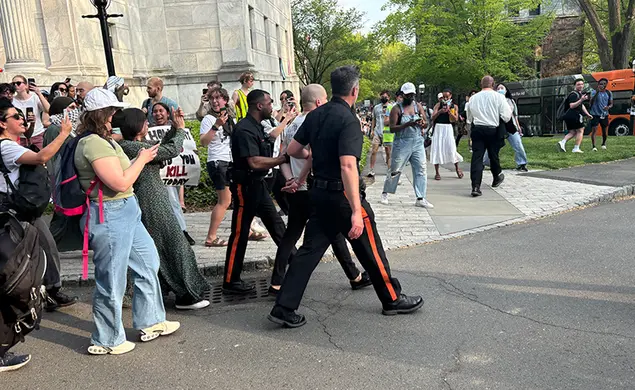15 Campus Protesters Still Face Charges After Court Hearing
More than 125 people joined the virtual hearing, many displaying “Mercer County: Drop the Charges” signs

The cases against the 15 pro-Palestinian protesters who were arrested on Princeton’s campus in the spring are proceeding after Judge John McCarthy III ’69 declined to dismiss the charges at a pre-trial hearing on Sept. 10.
The defendants and their attorneys appeared virtually at the hearing, and Aymen Aboushi, who represents 13 of the defendants, unsuccessfully motioned to dismiss the charges of defiant trespassing without prejudice by arguing that conditions for the charges had not been met. The statute requires notice of trespass through communication, signs, or fencing, which Aboushi said was not given prior to the arrests, citing body camera footage as proof. Aboushi also read from the University’s Statement on Freedom of Expression, which he said gives students broad license to express themselves.
Though the University is not a party to the trial, at the hearing, Aboushi mentioned conversations with administrators and an outside counsel. In the spring, the University announced that those arrested were unlikely to face penalties greater than probation in the campus disciplinary system. Princeton Israeli Apartheid Divest (PIAD) posted on X, formerly known as Twitter, that those arrested were given four years of disciplinary probation by the University. The University declined to comment.
Municipal prosecutor Christopher Koutsouris argued that University guidelines are not equivalent to the law.
“These are trial issues,” McCarthy said in rejecting the motion. “There’s just no basis for this in municipal court.”
After his motion to dismiss was rejected, Aboushi successfully requested that the court set a “neutral date,” by which time the defendants would decide whether to accept a plea that Koutsouris said was offered months ago or proceed to trial. McCarthy agreed and Oct. 1 was chosen.
Aboushi is representing the people who were arrested on April 29 during the occupation of Clio Hall: five undergraduates, six graduate students, a postdoctoral researcher, and a local seminarian who took a class at the University last semester. The protesters later said their actions were peaceful, though PAW has spoken with staff members in Clio who called the situation frightening.
Attorney Omar Qadeer represents the two graduate students who were arrested on April 25 for attempting to set up tents outside McCosh Hall. He joined Aboushi in the motion.
PIAD encouraged supporters to attend the virtual hearing, and more than 125 people joined, with many displaying “Mercer County: Drop the Charges” as their profile photo or background.











1 Response
Norman Ravitch *62
1 Year AgoSeeking Resolution to the War in Gaza
To drop the charges against the anti-Israel protesters may warm the hearts of those appalled by the suffering of the Palestinian people. I share much of that. A very large number of citizens of Israel also disagree with the ultra-right-wing government of their country. But the Israelis have also suffered greatly from the terrorism of Hamas and other radical supporters of the Palestinians. It may be naive to expect a sane resolution of the struggle here, but naive or not it must be sought. Endless war satisfies no one.